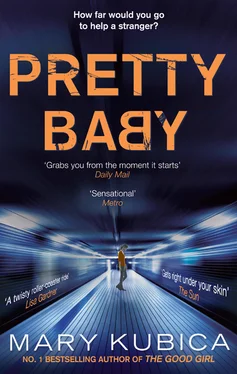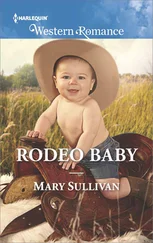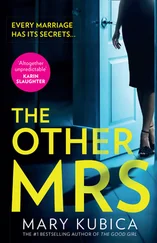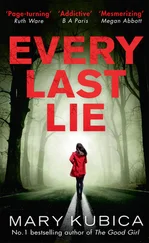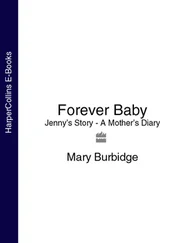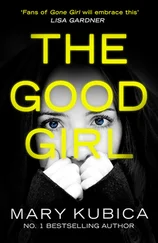A chance encounter sparks an unrelenting web of lies in this stunning new psychological thriller from national bestselling author Mary Kubica
She sees the teenage girl on the train platform, standing in the pouring rain, clutching an infant in her arms. She boards a train and is whisked away. But she can’t get the girl out of her head…
Heidi Wood has always been a charitable woman: she works for a nonprofit, takes in stray cats. Still, her husband and daughter are horrified when Heidi returns home one day with a young woman named Willow and her four-month-old baby in tow. Disheveled and apparently homeless, this girl could be a criminal—or worse. But despite her family’s objections, Heidi invites Willow and the baby to take refuge in their home.
Heidi spends the next few days helping Willow get back on her feet, but as clues into Willow’s past begin to surface, Heidi is forced to decide how far she’s willing to go to help a stranger. What starts as an act of kindness quickly spirals into a story far more twisted than anyone could have anticipated.
MARY KUBICAholds a Bachelor of Arts degree from Miami University in Oxford, Ohio, in History and American Literature.She lives outside Chicago with her husband and two children and enjoys photography, gardening and caring for the animals at a local shelter. Pretty Baby is her second novel. Visit her website, www.MaryKubica.com.
Also by Mary Kubica
THE GOOD GIRL
Pretty Baby
Mary Kubica

For the ones I’ve lost
Contents
Cover
Back Cover Text
About the Author
Booklist
Title Page
Dedication
HEIDI
CHRIS
HEIDI
CHRIS
HEIDI
WILLOW
HEIDI
WILLOW
CHRIS
HEIDI
CHRIS
WILLOW
HEIDI
WILLOW
HEIDI
WILLOW
CHRIS
WILLOW
CHRIS
HEIDI
WILLOW
HEIDI
CHRIS
HEIDI
CHRIS
WILLOW
HEIDI
WILLOW
HEIDI
WILLOW
HEIDI
WILLOW
CHRIS
HEIDI
WILLOW
CHRIS
WILLOW
HEIDI
WILLOW
CHRIS
WILLOW
HEIDI
WILLOW
HEIDI
WILLOW
HEIDI
WILLOW
HEIDI
WILLOW
CHRIS
WILLOW
HEIDI
WILLOW
CHRIS
HEIDI
WILLOW
Extract
ACKNOWLEDGMENTS
Endpages
Copyright
HEIDI
The first time I see her, she is standing at the Fullerton Station, on the train platform, clutching an infant in her arms. She braces herself and the baby as the purple line express soars past and out to Linden. It’s the 8th of April, forty-eight degrees and raining. The rain lurches down from the sky, here, there and everywhere, the wind untamed and angry. A bad day for hair.
The girl is dressed in a pair of jeans, torn at the knee. Her coat is thin and nylon, an army green. She has no hood, no umbrella. She tucks her chin into the coat and stares straight ahead while the rain saturates her. Those around her cower beneath umbrellas, no one offering to share. The baby is quiet, stuffed inside the mother’s coat like a joey in a kangaroo pouch. Tufts of slimy pink fleece sneak out from the coat and I convince myself that the baby, sound asleep in what feels to me like utter bedlam—chilled to the bone, the thunderous sound of the “L” soaring past—is a girl.
There’s a suitcase beside her feet, vintage leather, brown and worn, beside a pair of lace-up boots, soaked thoroughly through.
She can’t be older than sixteen.
She’s thin. Malnourished, I tell myself, but maybe she’s just thin. Her clothes droop. Her jeans are baggy, her coat too big.
A CTA announcement signals a train approaching, and the brown line pulls into the station. A cluster of morning rush hour commuters crowd into the warmer, drier train, but the girl does not move. I hesitate for a moment—feeling the need to do something —but then board the train like the other do-nothings and, slinking into a seat, watch out the window as the doors close and we slide away, leaving the girl and her baby in the rain.
But she stays with me all day.
I ride the train into the Loop, to the Adams/Wabash Station, and inch my way out, down the steps and onto the waterlogged street below, into the acrid sewage smell that hovers at the corners of the city streets, where the pigeons amble along in staggering circles, beside garbage bins and homeless men and millions of city dwellers rushing from point A to point B in the rain.
I spend whole chunks of time—between meetings on adult literacy and GED preparation and tutoring a man from Mumbai in ESL—imagining the girl and child wasting the better part of the day on the train’s platform, watching the “L” come and go. I invent stories in my mind. The baby is colicky and only sleeps in flux. The vibration of approaching trains is the key to keeping the baby asleep. The woman’s umbrella—I picture it, bright red with flamboyant golden daisies—was manhandled by a great gust of wind, turned inside out, as they tend to do on days like this. It broke. The umbrella, the baby, the suitcase: it was more than her two arms could carry. Of course she couldn’t leave the baby behind. And the suitcase? What was inside that suitcase that was of more importance than an umbrella on a day like this? Maybe she stood there all day, waiting. Maybe she was waiting for an arrival rather than a departure. Or maybe she hopped on the red line seconds after the brown line disappeared from view.
When I come home that night, she’s gone. I don’t tell Chris about this because I know what he would say: who cares?
I help Zoe with her math homework at the kitchen table. Zoe says that she hates math. This comes as no surprise to me. These days Zoe hates most everything. She’s twelve. I can’t be certain, but I remember my “I hate everything” days coming much later than that: sixteen or seventeen. But these days everything comes sooner. I went to kindergarten to play, to learn my ABCs; Zoe went to kindergarten to learn to read, to become more technologically savvy than me. Boys and girls are entering puberty sooner, up to two years sooner in some cases, than my own generation. Ten-year-olds have cell phones; seven- and eight-year-old girls have breasts.
Chris eats dinner and then disappears to the office, as he always does, to pour over sleepy, coma-inducing spreadsheets until after Zoe and I have gone to bed.
* * *
The next day she’s there again. The girl. And again it’s raining. Only the second week of April, and already the meteorologists are predicting record rainfall for the month. The wettest April on record, they say. The day before, O’Hare reported 0.6 inches of rain for a single day. It’s begun to creep into basements, collect in the pleats of low-lying city streets. Airport flights have been cancelled and delayed. I remind myself, April showers bring May flowers , tuck myself into a creamy waterproof parka and sink my feet into a pair of rubber boots for the trek to work.
She wears the same torn jeans, the same army-green jacket, the same lace-up boots. The vintage suitcase rests beside her feet. She shivers in the raw air, the baby writhing and upset. She bounces the baby up and down, up and down, and I read her lips— shh . I hear women beside me, drinking their piping-hot coffee beneath oversize golf umbrellas: she shouldn’t have that baby outside. On a day like today? they sneer. What’s wrong with that girl? Where is the baby’s hat?
The purple line express soars past; the brown line rolls in and stops and the do-nothings file their way in like the moving products of an assembly line.
Читать дальше
